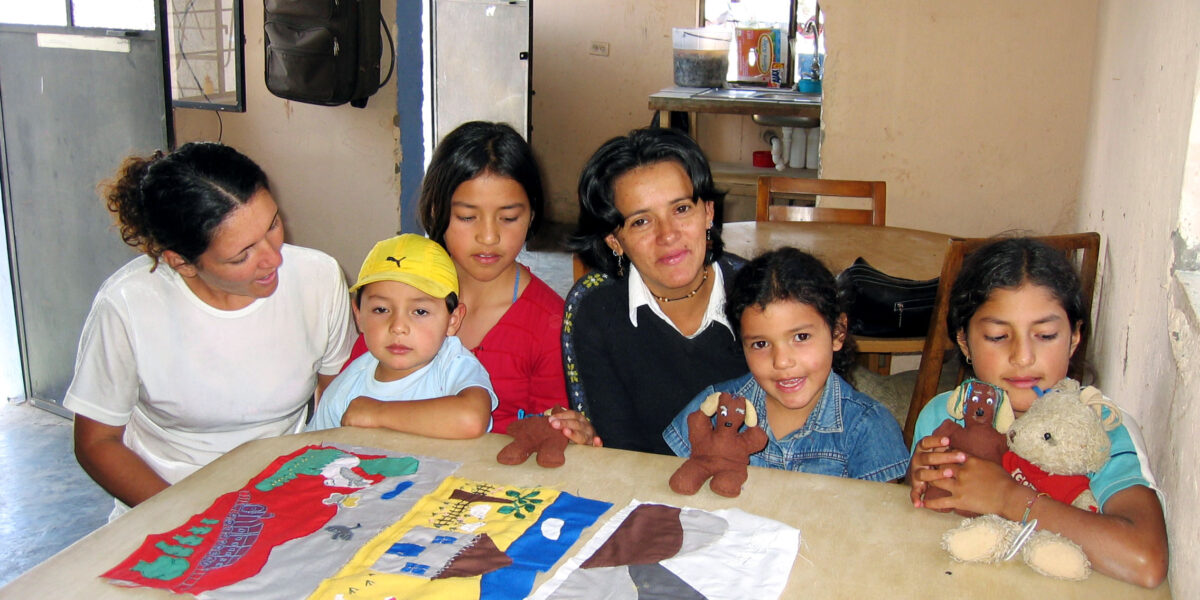Two months ago, Carlos and Maria* arrived in Ecuador with their son, daughter and nephew. During their first week in Quito, while seeking help in their difficult transition from a rural farm in Colombia to the capital city of neighboring Ecuador, they happened upon the Mennonite church.
When Carlos and Maria expressed interest in having me visit their home in a nearby small town, where they had moved because of cheaper rent, I jumped at the chance to hear their story. After a two-hour bus ride a week later, I found myself at their doorstep. Their warm faces were a happy contrast to their windowless, empty “new” house.
As they welcomed me into their living space, we sat down on their only furnishings, two thin mats and two blankets, which covered the damp floor. These were gifts from the Mennonite church in Quito, where the five members of their family had found refuge after spending a week sleeping on scraps of cardboard. The stained, wet walls were sparsely decorated by a few pencil drawings—depictions of the farm in Colombia that Maria had inherited from her parents. The Revolutionary Armed Forces of Colombia (FARC, a guerrilla group involved in countless kidnappings and acts of violence) had forcefully taken the farm from Carlos and Maria’s family just weeks before.
Carlos and Maria described how members of FARC accused the family of supporting the opposition paramilitary groups. After death threats and the attempted murder of Carlos, the family decided there was no other choice but to leave their beloved farm behind and flee to Ecuador. Thinking they could leave their problems in Colombia, the family had high hopes of a better life in Ecuador.
However, a week into their time in Ecuador, they had been accused by an Ecuadorian store owner of stealing. They felt targeted because of their dark skin and Colombian accent. As the police interrogated and searched them, their daughter began to cry, thinking that the Ecuadorian police were members of FARC, who were going to take her father away.
A week later, when I called Carlos and Maria to follow up on their situation and see how things were going, they informed me that they were no longer living in the same house. The owners of the house had oddly decided to do repairs late at night above the room where Carlos, Maria and their family slept huddled together on their two mats. In addition to being repeatedly awakened by noise, the family was soaked by water that poured through the cracks of their wooden ceiling when the owners decided to wash the floor at 11 p.m. Carlos and Maria understood that they were no longer welcome.
It took Carlos, Maria and their children a few weeks to accept my invitation to be part of our church community, but one Sunday the family showed up at our church in Quito. I was moved as Carlos stood up during sharing time to express his gratitude for the mats and blankets we had given him so that his family no longer had to sleep on cardboard on the damp floor. But I almost broke down when Carlos expressed gratitude that his family was not alone in their struggle. They now had friends and a community—a foundation for beginning a new life in Ecuador.
Carlos and Maria are currently in a temporary shelter in Quito. Since moving, Carlos and Maria’s son, their son’s wife and their two children joined them in Quito––having been forced to flee persecution in Colombia. Their family, along with thousands of other Colombian refugees, continue to seek job stability, community, prosperity, freedom from discrimination and refuge from violence and persecution. The Mennonite community of Quito continues to seek answers to these large, complex problems, beginning with a helping hand and an open heart.
* Names have been changed for protection.
##
 David H. Shenk (Community Mennonite Church in Harrisonburg, Va., and Iglesia Menonita del Buen Pastor in Goshen, Ind., is a Mennonite Mission Network worker living in Quito, Ecuador.
David H. Shenk (Community Mennonite Church in Harrisonburg, Va., and Iglesia Menonita del Buen Pastor in Goshen, Ind., is a Mennonite Mission Network worker living in Quito, Ecuador.







